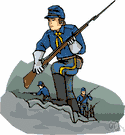combat
Also found in: Thesaurus, Medical, Legal, Acronyms, Idioms, Encyclopedia, Wikipedia.
com·bat
(kəm-băt′, kŏm′băt′)combat
com•bat
(v. kəmˈbæt, ˈkɒm bæt; n. ˈkɒm bæt)v. -bat•ed, -bat•ing (esp. Brit.) -bat•ted, -bat•ting, v.t.
Combat
battle royal A free-for-all; an encounter of many combatants; a heated argument or altercation. The term derives from the type of endurance contest, especially common in cockfighting, in which the ultimate victor is determined by a process of elimination through survival of many trial heats. The badly wounded survivor of these repeated pairings is often barely alive at battle’s close. Another type of battle royal from which the expression might derive was the custom of entering a number of pugilists into the ring at once, who fought each other in random and brutal fashion until only one remained conscious. Ralph Ellison includes a graphic description of the barbarous practice in Invisible Man.
broach [someone’s] claret To give someone a bloody nose. This euphemistically elegant expression for a very inelegant action and its result plays on the meaning of broach ‘to draw liquor from a cask’ and on claret as a red wine of Bordeaux.
donnybrook A wild fight or brawl, a melee or free-for-all; also Donnybrook Fair. For centuries, an annual two-week fair was held each summer in Donnybrook, Ireland. Invariably, vast amounts of whiskey were consumed and the huge crowds got out of control, turning the fair into a massive drunken brawl. Because of such consistently riotous behavior, the Donnybrook Fair was abolished in 1855, although to this day its name denotes any type of wild, general fighting.
fight like Kilkenny cats To fight fiercely and bitterly until both sides have been destroyed; to argue or debate viciously and with determination. Several marginally plausible legends surround this expression, the most popular of which holds that in the Irish Rebellion of 1798, some sadistic soldiers stationed in Kilkenny enjoyed the “sport” of tying two cats together by their tails and hanging them over a clothesline so that, face to face, they would fight to the death. When an officer approached to break up this daily activity, a soldier cut off the cats’ tails with his sword, and the cats escaped. When confronted by the officer, the soldier insisted that the cats had fought so viciously that they had eaten each other, leaving only the tails behind. A more likely explanation, however, is that the cats are allegorical symbols for two rival towns, Kilkenny and Irishtown, which for more than 300 years waged a bitter border dispute. By 1700, both towns were devastated and impoverished. A similar expression is as quarrelsome as Kilkenny cats.
introduce the shoemaker to the tailor To kick someone in the buttocks or rear end; to kick someone in the pants. This euphemism is a British colloquial expression.
knock for a loop See CONFUSION.
knock galley-west To incapacitate, to put someone out of action; to give such a severe blow as to cause unconsciousness; to knock for a loop, to throw off balance, to disorient or confuse. Galley-west is an alteration of the British dialectal colly-west ‘awry, askew.’ This colloquial Americanism dates from the latter part of the 19th century. The phrase is not limited in application to physical combat; it can also apply to mental or emotional disorientation resulting from the debunking of one’s ideas, arguments, or beliefs.
Your verdict has knocked what little [critical penetration] I did have galley-west! (Mark Twain, Letters, 1875)
knock the tar out of To thrash, whale, or beat senseless; also often beat the tar out of. The precise origin of the phrase is unknown. A plausible conjecture says it derives from the former practice of caulking a ship’s bottom with tar, which would require an extremely severe shock or blow to loosen.
lay out in lavender See REPRIMAND.
lead a cat and dog life To fight or bicker constantly; to be contentious, quarrelsome, or argumentative on a regular basis. This expression alludes to the snapping and vicious battling associated with these two animals whenever they encounter each other.
lock horns To enter into conflict; to clash; to contend. Various species of mammals have horns for self-defense, and the reference is probably to the locking of bucks’ horns when they “duel.” The expression suggests a vehement entanglement between two people.
make [someone] see stars To hit someone on the head with such force that he experiences the illusion of brilliant spots of light before his eyes; to knock someone out.
make the fur fly To cause a ruckus or commotion, to create a disturbance, to shake things up; also make the feathers fly. The allusion is to animals or gamecocks engaged in such a violent struggle that they tear out each other’s fur or feathers. Both expressions date from at least the 19th century.
Al Hayman is going to make the fur fly when he gets back from Europe. (New York Dramatic News, July, 1896)
measure swords To fight or do battle either physically or verbally; to compete or contest, to match wits with, to pit one’s strength against. This expression originated when dueling was the gentlemanly method of settling disputes and defending honor. Swords chosen as weapons were measured against each other to guarantee that they were of the same length and that neither party had an advantage. Although measuring swords was originally a preliminary to a duel or fight, by extension it came to mean the fighting itself. The equivalent French expression is mesurer les épées. Shakespeare uses the phrase in As You Like It (V, iv):
And so we measured swords and parted.
pull caps To quarrel and wrangle in an undignified manner. Cap refers to ‘headgear.’
Our lofty Duchesses pull caps, And give each other’s reputation raps.
(Thomas Perronet Thompson, Exercises, Political and Others, 1842)
This obsolete expression dating from the 18th century reputedly applied only to women, although OED citations indicate that men also “pulled caps.”
Men are exhorted to struggle and pull caps. (John Wolcott, Lyric Odes to the Royal Academicians, 1785)
take up the hatchet To begin or resume fighting, to prepare for war; also dig up or unbury the hatchet, ax, or tomahawk. To symbolize the resumption of hostilities, North American Indians would dig up war weapons, which had been buried as a sign of good faith when concluding a peace.
Three nations of French Indians … had taken up the hatchet against the English. (George Washington, Daily Journal in 1751-52)
The expression, now obsolete, dates from the late 1600s. See also bury the hatchet, PEACE.
tan [someone’s] hide To whip, beat, or thrash soundly; to knock the tar out of someone. Theoretically, severe, repeated beatings would harden or toughen one’s skin, just as the tanning process does to hide in converting it to leather. The expression has been used in this figurative sense since the 17th century.
wigs on the green A fight, altercation, fracas, fray; a commotion; a difference of opinion that could lead to fisticuffs. This expression stems from the days when British gentlemen wore powdered wigs and often settled differences “in manly fashion” on the public greens. Since their wigs were likely to be pulled off during the pugilistics, wigs on the green became a euphemistic reference to a scuffle or brawl.
Whenever they saw them advancing, they felt that there would be wigs on the green. (Sir Montagu Gerard, Leaves From the Diaries of a Soldier and Sportsman, 1903)
combat
Past participle: combated
Gerund: combating
| Imperative |
|---|
| combat |
| combat |
| Noun | 1. |  combat - an engagement fought between two military forces combat - an engagement fought between two military forcesbattle, engagement, fight, conflict - a hostile meeting of opposing military forces in the course of a war; "Grant won a decisive victory in the battle of Chickamauga"; "he lost his romantic ideas about war when he got into a real engagement" hostilities, belligerency - fighting; acts of overt warfare; "the outbreak of hostilities" trench warfare - a type of armed combat in which the opposing troops fight from trenches that face each other; "instead of the war ending quickly, it became bogged down in trench warfare" war, warfare - the waging of armed conflict against an enemy; "thousands of people were killed in the war" aggression - the act of initiating hostilities armed forces, armed services, military, military machine, war machine - the military forces of a nation; "their military is the largest in the region"; "the military machine is the same one we faced in 1991 but now it is weaker" |
| 2. |  combat - the act of fighting; any contest or struggle; "a fight broke out at the hockey game"; "there was fighting in the streets"; "the unhappy couple got into a terrible scrap" combat - the act of fighting; any contest or struggle; "a fight broke out at the hockey game"; "there was fighting in the streets"; "the unhappy couple got into a terrible scrap"gunfight, gunplay, shootout - a fight involving shooting small arms with the intent to kill or frighten conflict, struggle, battle - an open clash between two opposing groups (or individuals); "the harder the conflict the more glorious the triumph"--Thomas Paine; "police tried to control the battle between the pro- and anti-abortion mobs" close-quarter fighting - hand-to-hand fighting at close quarters dogfight - a violent fight between dogs (sometimes organized illegally for entertainment and gambling) fencing - the art or sport of fighting with swords (especially the use of foils or epees or sabres to score points under a set of rules) in-fighting - conflict between members of the same organization (usually concealed from outsiders) set-to - a brief but vigorous fight shock, impact - the violent interaction of individuals or groups entering into combat; "the armies met in the shock of battle" affaire d'honneur, duel - a prearranged fight with deadly weapons by two people (accompanied by seconds) in order to settle a quarrel over a point of honor blow - a powerful stroke with the fist or a weapon; "a blow on the head" free-for-all, brawl - a noisy fight in a crowd gang fight, rumble - a fight between rival gangs of adolescents single combat - a fight between two people; "in all armies there were officers who needed to prove their bravery by single combat" | |
| Verb | 1. |  combat - battle or contend against in or as if in a battle; "The Kurds are combating Iraqi troops in Northern Iraq"; "We must combat the prejudices against other races"; "they battled over the budget" combat - battle or contend against in or as if in a battle; "The Kurds are combating Iraqi troops in Northern Iraq"; "We must combat the prejudices against other races"; "they battled over the budget"fight, struggle, contend - be engaged in a fight; carry on a fight; "the tribesmen fought each other"; "Siblings are always fighting"; "Militant groups are contending for control of the country" dogfight - engage in an aerial battle with another fighter plane wrestle - combat to overcome an opposing tendency or force; "He wrestled all his life with his feeling of inferiority" |
combat
fight support, accept, give up on, surrender to, make peace with, acquiesce with, declare a truce with